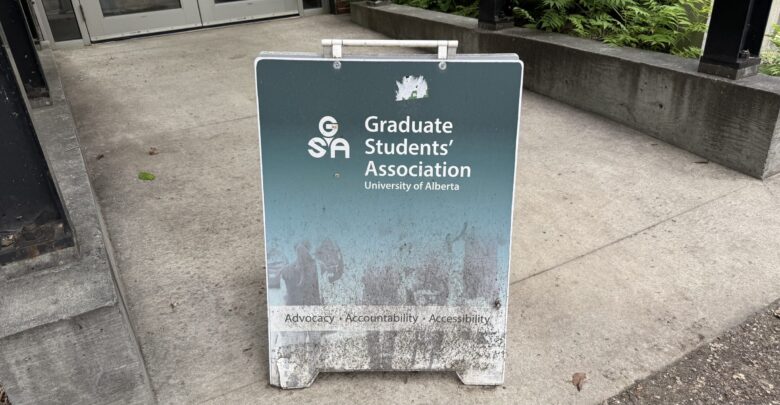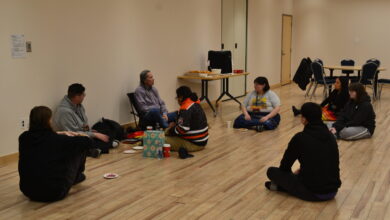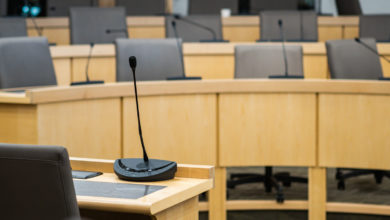GSA Council elects Tamara Dubé as vice-president (Indigenous relations)
After her original appoint was rescinded, the GSA Council voted to elect Tamara Dubé as the first vice-president (Indigenous relations).
 Jasleen Mahindru
Jasleen MahindruOn July 16, the Graduate Students’ Association (GSA) Council voted to elect Tamara Dubé to the position of vice-president (Indigenous relations) (VPIR). This makes Dubé the first VPIR in the GSA’s history.
Dubé is Red River Métis and is part of both the Manitoba Métis Nation and the Alberta Métis Nation. She is studying occupational therapy at the Augustana campus.
Dubé was previously appointed to the position by the Indigenous Graduate Students’ Association (IGSA) through a motion at the Elections and Referenda Committee (ERC). The ERC later rescinded the motion that allowed the appointment, citing bylaw and policy violations.
At the previous GSA Council meeting a motion was passed directing the ERC to create an action plan in regards to the VPIR position. It was clarified at that meeting that the action plan would be to have the IGSA nominate someone for the position. That person would then be brought to council.
“I have went through absolute hell the past few months,” Dubé says
Directly elected officers (DEOs), which includes the president and vice-presidents, were advised not to participate in discussions to avoid interfering with or influencing the election process.
Elsie Osei, the chair of the ERC, said that in consultation with the IGSA, Dubé was nominated to fill the VPIR role.
“I have went through absolute hell the past few months,” Dubé said. “And this has not been a positive experience for me at all. It was not what I was expecting in any capacity.”
She said that when she initially put herself forward for the VPIR role during the by-election, she dropped out due to scrutiny from staff. Dubé said GSA staff questioned her about her program and being located at the Augustana campus.
She also said she felt uncomfortable that the IGSA was not involved in the election process.
Meredith Leary spoke on behalf of the IGSA at the council meeting to express their support for Dubé.
“We need an Indigenous voice in the role to ensure that finding Indigenous representation on the GSA doesn’t come at such a high emotional and psychological cost,” Leary said.
“We would like to remind everyone that as non-Indigenous people, you have a responsibility to hear Indigenous voices that have already spoken in support of [Dubé], no matter what emotion they speak. [Dubé] has been chosen by Indigenous students.”
“Many students feel it is important [the VPIR role] should be filled,” Osei says
Leary said that in the IGSA elections, if you are the only candidate you are accepted into the role by acclimation. After numerous conversations with the IGSA executives and council, they concluded that Dubé should assume the position.
The Chief Electoral Officer (CRO) Wajid Ali asked if other Indigenous students were made aware of the opportunity to fill the VPIR position.
“There has been an election and a by-election that, according to the GSA, have been appropriately advertised,” Leary said. “So this position is not a secret. We have had nobody reach out.”
She said the IGSA had also sent out statements about the position in a newsletter and on social media.
Ali also asked how the IGSA has been consulted.
Osei said there had already been consultations, but when the original appointment was made, the issue was that it was labelled as an appointment and not a nomination.
“Really, I don’t think there’s an issue right now. [The IGSA] attended our meetings, we asked questions, they answered our questions. And when they had questions to ask, the ERC also provided answers. And so yes, they’ve gone through the process.”
“Many students feel it is important that [the VPIR role] should be filled,” Osei said.
“I’m hoping that maybe we can have a healing circle or we can sit down with the knowledge keeper,” Dubé says
Savannah Ribeiro, the departmental councillor for political science, asked how Dubé sees the VPIR role in light of the events that have happened over the past couple months.
“I’d like to move forward as a group. I realized that all of this stuff that’s happened over the last two months, it’s been a really big eye opener on how desperately there is a need for this position,” Dubé said.
“I realize that the role is a lot of not just representing Indigenous students, because Hazel [Emma Kemuma] also represents Indigenous students as the [vice-president] (student life). But it’s building relations between Indigenous students and non-Indigenous students.”
Dubé was also asked what her relationship would be with other DEOs moving forward and working together with them.
She said that she has been surprised by the treatment she’s received from some of them, largely that they’ve ignored her.
“I’m hoping that maybe we can have a healing circle or we can sit down with the knowledge keeper, have some sort of a sharing circle, have something where we can kind of come together,” Dubé said.
“I think that with everything that’s kind of happened, there’s surface level stuff that we all see. And then there’s the deep barrier like some people might not be completely aware of why there were so many people being upset about what was happening.”
Legality of nomination clarified, motion to elect Dubé passes
Previously, GSA President Aashish Kumar had told council that allowing the original appointment or nomination of Dubé by council would violate the GSA’s bylaws and Post-Secondary Learning Act.
The GSA bylaws state that if a position is unfilled after a by-election, it shall remain vacant for one year. The VPIR policy, however, says the GSA Council should nominate someone for the position in close consultation with the IGSA if the by-election is unsuccessful.
Osei clarified that the legal opinion that was shared with her stated that council could legally nominate someone.
She explained that the ERC could not come to a decision on the specifics of the action plan. She said this was partially due to some members resigning due to the pressure of the situation.
Osei said she took it upon herself as the chair to present options to the GSA Council for how to move forward.
“So as the ERC chair, even though the ERC was unable to come to a conclusion, as the chair, I’m stepping up to my role as saying, okay, we are going to use the policy this time,” Osei said. “Then in the subsequent months we will rectify the bylaws and the policy to respond and fill up all those gaps.”
One option was to have councillors vote to elect Dubé to the position of VPIR. The second option was to call an election for all graduate students to vote on Dubé’s nomination for the role.
After discussion, the GSA Council voted for the first option. The vote to elect Dubé passed with 29 votes in favour, one against, and three abstaining. Council immediately voted to ratify the results, with 35 in favour and one abstaining.




